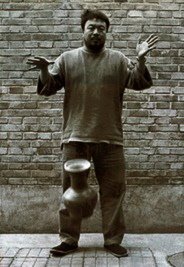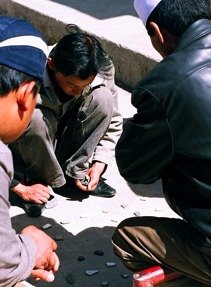A couple of experiences last week from the wider Chinese educational sphere. The first has been observed numerous times before but never fails to act as a shining, though diminishing light on the mentality being bred inside Chinese educational institutions. I happily got my kids this week, 60 odd in a class, throwing up hands to answer questions, the answers simply being dragged off the page and into their mouths, as not simply a sentence in a book but an answer to a question, no problem, these kids are pretty good. Then, for the third activity I introduced a question that had two perfectly acceptable and simple sentence answers, these answers I wrote on the board leaving space for the appropriate activity to be added by the students. However, instead of this time being greeted by a lightening show of hands I was faced with confusion and dis-interest. Maybe they were tired but on checking they actually didn’t understand how to answer. Now this is the concern, the level was most certainly within their range and answers could be found within their known vocabulary. The sentence questions and answers were again carefully explained to them, a few more hands but not many. Chinese children when faced with having to actually think of an answer for themselves have no answer.
However, instead of this time being greeted by a lightening show of hands I was faced with confusion and dis-interest. Maybe they were tired but on checking they actually didn’t understand how to answer. Now this is the concern, the level was most certainly within their range and answers could be found within their known vocabulary. The sentence questions and answers were again carefully explained to them, a few more hands but not many. Chinese children when faced with having to actually think of an answer for themselves have no answer. This leads me onto my second little anecdote of the week and that involves my very articulate 17-18 year old 1-1 student. She asked at one point during our class whether I knew what 资本主义 means, I did, it means capitalism. She then laid out the words for communism, socialism and capitalism on the table, talked a little of the Communist Party and then continued to tell me that China is a socialist society.
This leads me onto my second little anecdote of the week and that involves my very articulate 17-18 year old 1-1 student. She asked at one point during our class whether I knew what 资本主义 means, I did, it means capitalism. She then laid out the words for communism, socialism and capitalism on the table, talked a little of the Communist Party and then continued to tell me that China is a socialist society.
At this point, I was considering whether to move onto another topic or to dig a little further on this topic, you can’t break habits of a lifetime (or you can but it takes the desire to want to) so I continued. I gave her a few examples of small and large organizations in China that we both knew, including the Jiaozi restaurant across the street and the Chinese health service, and asked who paid for the services or products. That was us, and who produced, distributed and profited, it was the private individuals or companies involved. I admittedly did point out that a number of the major utilities and banks were still state or part state owned. I then asked her which system was it that China was. She somewhat hesitantly pointed to socialism. I asked her why that was her answer, she was silent for a moment before stating "that is what they told us at school". After a couple of awkward moments where she was clearly playing over the scenario in her head we moved on.
I then asked her which system was it that China was. She somewhat hesitantly pointed to socialism. I asked her why that was her answer, she was silent for a moment before stating "that is what they told us at school". After a couple of awkward moments where she was clearly playing over the scenario in her head we moved on.
China is obviously a mix of capitalism and socialism and although my most certainly non-expert opinion does not allow me a position to define it as one or the other it certainly seems a capitalist society to me. The fact is that the type of economic system that you and I experience here on a daily basis, is most certainly one of a free market persuasion, even if the devil-is-in-the-detail- as an aside- the inequality here between the majority and the wealthiest is almost fantastical in its extreme.
Friday, 13 March 2009
An Inability To Answer And The "No Why" Situation
There is an amusing, though often frustrating, anecdotal manifestation of this in the wider society, and that represents the non-necessity of an answer because there is actually a denial even of a question. It is when you are instructed to do something by a security guard, an official of some kind or some other worker, or just hear someone's opinion on something and you ask "why? The answer in Chinese is 没有为什么 which directly means not have why or no why.
However, what was most interesting was the ease with which an obviously intelligent and actually quite challenging person could quite easily turn to a previously heard answer rather than give her own opinions. I might also point out that she is much more inquisitive and questioning than a vast majority of the young people one comes across here. These anecdotes are not meant as slights but merely as thought evoking observations.
Subscribe to:
Post Comments (Atom)












1 comment:
This might give a pretty good insight into why H1-Bs tend to have underdeveloped problem-solving skills.
Post a Comment